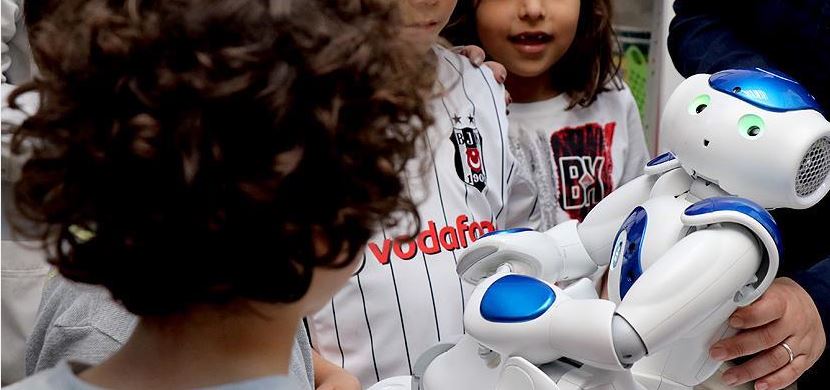What Kind of Teachers will Continue to Flourish in the Fourth Industrial Revolution?
A Student is talking with the robot and at the same time entering various steps of the Math task on the robot’s keyboard. The robot is giving supportive feedback to the student all the time.
“Well done Lisa, now let’s try the next task.” The student is practicing rounding with big numbers and the robot is teaching and guiding the student.

Picture: 19 Mayıs 2018, Cumartesi Güncelleme, twitter
One group of students is connected with students on the other corner of the world. They are telling how they have collected data of the population in near villages and cities. They are discussing what would be the best rounding accuracy for every village and city. They are debating and defending their point of view why they are rounding in different accuracy than students in the other class.
Teacher is looking from the wall monitor one group which is collecting number of cars in the near traffic roundabout. This group is doing a project work of cars and part of project is collecting data and use statistics. The group can ask help virtually from the Road Safety.
It is only couple of years ago when people were talking how artificial Intelligence is going to change the world. The use of artificial intelligence in education has become more common than we thought. We are now daily using applications of AI like:
- grading students’ written answers
- Bots that answer students’ questions
- Virtual personal assistants that tutor students
- Virtual reality and computer vision for immersive, hands-on learning
- Simulations and gamification with rich learning analytics
We also have learned that thinking is the most important aspect of the school culture. Teachers have remained as authorities in the classroom on content, analysis and propriety. Teachers have become more vital than ever for steering students to the best, and away from the most spurious sources of information in the digital world. The 21st-century classrooms are marked by not one center of authority—the teacher as all-knowing—but by many more. The students are also authorities on technology, with the teachers as content masters and learned guides.
All this have made us to co-exist and co-create with AI and changed at last totally the Math education to the next level in the school. AI have forced teachers around the world to develop their teaching methods more versatile and students-centered.
Is the text above our future?
Every teacher today is more or less using new technology products with more or less confidence. We need to learn all the time, being life-long learners, and at the same time we think and need to be critical – what is the quality of learning?
At the same time self-driving cars have been tested, and we’ll start to take for granted disease-diagnosing algorithms. It is clear that schools will change as places and how we will teach and learn there.
We need also to be very aware that there is no way to predict exactly what students will need to know. Students are aware that they will need to be flexible, able to work collaboratively, be comfortable with experimentation and be able to embrace and embody what it means to be a lifelong learner.
Hope #AI forces us to change our Maths education
As part of the Top Global Teacher Bloggers / CMRubinWorld.com / Global Search for Education http://www.cmrubinworld.com/TGTB, above is my answer to question of May: What kind of teachers will continue to flourish in the Fourth Industrial Revolution?
